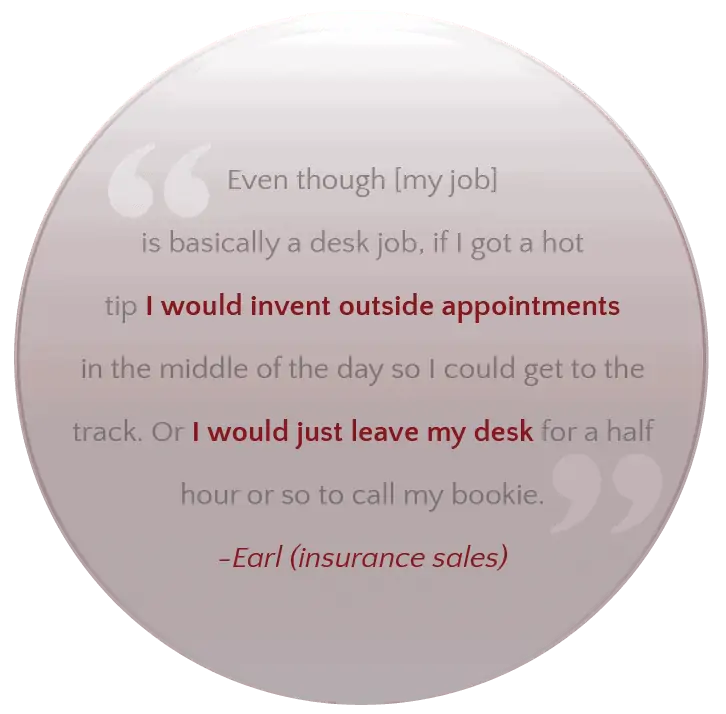Problem Gambling and the Workplace
Gambling and gambling related activities are frequently carried out during work hours. The workplace is used as a shield to hide the problem gambling from family members. This leaves managers and co-workers as the first line of defense. The challenge is to identify the problem gambler before they become desperate. To this end, it is important that all employers and employees develop a greater awareness of the signs associated with a gambling problem.
Effects on the Workplace
Although not often recognized, problem gambling is a significant workforce issue. The effects of a gambling problem almost always spill over into the workplace. This occurs through either the gamblers themselves or a family member who is living with the effects of a gambling problem. The workplace is primarily affected through lost time, lost productivity and, in desperate situations, the gambler may resort to theft.
Individuals with gambling problems can become completely preoccupied with gambling. The workday is often spent either in the act of gambling, planning the next opportunity or plotting to get money for gambling. As a result of lost time, the company’s productivity is damaged. The gambler becomes unreliable, misses project deadlines and important meetings and produces work that is of poor quality. Physical and emotional health problems associated with excessive gambling can further diminish work performance and attendance. Depression, anxiety, high blood pressure or stress-related illness can surface in individuals with gambling related problems and their family members.
Suicide and suicide attempts are high among individuals with gambling problems. Stressed family members are also at risk of suicide. The emotional, financial or legal problems can appear to be so severe that suicide looks like the only “way out.”

Workplace Signs of Gambling
- Work performance deteriorates; the person is preoccupied, has trouble concentrating, is absent or late for meetings and misses assignment deadlines.
- Frequent unexplained absences or disappearances from work.
- Eager to organize and participate in betting opportunities.
- Pay is requested in lieu of vacation time, large blocks of vacation time are not taken.
- Frequently borrows money, argues with co-workers about money that is owed to them.
- Complains about mounting debts.
- Excessive use of the telephone for personal calls.
- Experiences mood swings, often related to winning and losing streaks.
- Credit card or loan bills are mailed to work rather than home.
- Increasingly spends more time gambling during lunch hours and coffee breaks.
- False claims are made against expense accounts.
- Theft of company property.
Theft, Fraud and Embezzlement
Employees with severe problems may commit theft, fraud or embezzlement. Money is the gambler’s key to action. Once all legitimate avenues to obtain cash are exhausted, the gambler, in desperation, may resort to illegal acts to acquire case. The workplace becomes a primary avenue for the gambler to illegally finance their gambling. Gamblers do not see this activity as stealing. They see it as “borrowing money” and plan to replace it when they win.
1. Express concerns in a caring and supportive manner. Do not diagnose the problem or tell the individual what to do. Be clear, non-judgmental and speak only for yourself.
I’ve been noticing changes in your work, and I am concerned about you.
2. Use work-related observations.
I see you coming in very late from lunch every day, too distracted to work all afternoon.
3. Be positive.
You are a conscientious person with a history of doing good work.
4. Explain how the problem affects you.
I had to reassign two of your projects, because you missed three deadlines.
5. Be clear about your position.
I need you to perform your job duties to the best of your ability, your performance has been slipping and without corrective actions your job is in jeopardy.
6. Respect personal boundaries.
I don’t want to pry into your life, but I had to let you know that I am concerned. would be happy to talk to you about anything that is troubling you.
7. When a gambling problem is known, provide information, not advice.
Here is some information about available problem gambling resources, another resource available to you is our EAP professional. Here is the information.
8. Be prepared for denial or a hostile reaction.
It must be uncomfortable to hear this. It is difficult for me to bring it up, but I am concerned about you.
A proactive response from your organization will help reduce the negative impact problem gambling can have within the workplace. The following are some measures to consider:
- Policy Statements Incorporate the topic of gambling into relevant policies. Most companies have policies on internet use, phone use and disallowed activities during work hours. When reviewing policy statements make sure the policies are sufficiently comprehensive to address problem gambling issues, e.g., internet gambling.
- Provide Awareness Training Without awareness, problem gambling will not be detected. The signs of a gambling problem are seldom identified as gambling related. Training can help employees and employers to identify and assist the problem gambler.
- Make Financial Counseling Available Financial issues can be just as serious as a mental health disorder. It is important that financial counseling be made available to employees who are in a fiscal crisis.
- Monitor the Money Stream Some occupations involve direct contact with money while in other occupations money can be “moved.” These occupations might be considered high risk for the problem gambler and a monitoring system can protect employee and employer.




